Vitamin D Status Affects Body's Inflammatory Response, New Evidence Suggests


Vitamin D truly is the "jack of all trades" of essential vitamins: From bolstering bone and muscle health to supporting a healthy gut microbiome and clear skin, saying this vital nutrient supports pretty much all aspects of whole-body health is far from an overstatement.*
And while vitamin D is famous for quite a few health benefits, some are lesser-known—such as its ability to help support a healthy inflammatory response.*
Advertisement
Indeed, while scientific evidence suggests that vitamin D may play a role in modulating inflammatory pathways—i.e., due to an observed inverse association between serum 25-hydroxyvitamin D [25(OH)D] concentrations and C-reactive protein (CRP), one of the most widely used inflammatory biomarkers—the exact relationship between vitamin D levels and inflammatory response is not yet fully understood.*
And while we still have a ways to go before we have a comprehensive grasp of vitamin D's influence on inflammatory status, a new study published by the International Journal of Epidemiology reveals that the association between serum levels of 25(OH)D and CRP is likely driven by an effect of vitamin D status on CRP levels—not the other way around.
What is C-reactive protein?
Before we get too ahead of ourselves here, let's go over what C-reactive protein (CRP) is and how CRP levels help inform whether or not your inflammatory response is operating as it should.
CRP is a biological marker in our blood (i.e., via a blood test) that can be measured to help give us a snapshot of inflammatory processes in the body. CRP, especially high-sensitivity CRP (hs-CRP), is a helpful way to gauge general inflammatory status in the body, which has implications for our joints, heart, brain, and whole-body health.
Of course, inflammatory pathways and responses are a normal part of our physiology, of being human, but it's critically important to strike a healthy balance. Healthy levels of CRP (a protein produced by the liver) are associated with a balanced inflammatory response and status, as well as resilient immune function for our body's defenses.
Keeping inflammatory pathways in check, instead of "burning" unchecked, is pivotal for overall health. And since 25(OH)D levels (i.e., the blood biomarker measure of vitamin D sufficiency) have been observed to influence CRP status, ongoing research that investigates exactly how vitamin D plays a part in regulating a healthy inflammatory response is important to gain understanding of how the essential vitamin helps support cardiovascular, neurological, musculoskeletal, gastrointestinal, and immune health.*
Advertisement
The study design
Researchers analyzed 294,970 unrelated adults of white-British ancestry between the ages of 37 and 73 years from the UK Biobank study. Serum 25(OH)D and CRP concentrations were recorded, and genetic pathways were also considered in the study.
How vitamin D status influences the body's inflammatory response
The results of this associational study revealed two major takeaways:
- Higher genetically predicted vitamin D serum levels were associated with lower CRP concentrations.
- The effect of vitamin D status on CRP is restricted to the vitamin D deficiency range.
Advertisement
In other words, our CRP status (which, again, indicates whether our body's inflammatory response is working effectively or on overdrive) does not causally influence our vitamin D levels. Rather, those with a low vitamin D status (specifically, those deficient in the essential nutrient) are more likely to have higher levels of the CRP biomarker and, therefore, a subpar inflammatory response.
Scientists believe this is likely due to vitamin D's effect on vitamin D receptor-expressing immune cells (e.g., monocytes, B-cells, and T-cells). In fact, experiments in cellular models have demonstrated that the activated hormone form of vitamin D is able to inhibit the synthesis of pro-inflammatory cytokines and promote the production of anti-inflammatory cytokine IL-10.
Now, considering 29% of U.S. adults1 are deficient in vitamin D (and another 41% are insufficient1) and evidence suggests the vitamin holds influence over the body's inflammatory response, Americans would be smart to pay attention to this correlation.
The takeaway
It's clear that sufficient vitamin D levels can help support a number of important areas of whole-body health, including a healthy inflammatory response.* That said, reaching (and maintaining) a healthy vitamin D status is not always achieved easily.
The truth is, sunshine and diet alone are not efficient ways to achieve and sustain truly optimal levels of vitamin D throughout life. This is where a quality, high-potency, sustainably sourced vitamin D supplement (like mbg's vitamin D3 potency+) comes in!
mindbodygreen's innovative vitamin D formula delivers 5,000 IU of organic, plant-origin vitamin D3 (i.e., the dose recommended by health experts to achieve sufficiency) with an organic trio of avocado, olive, and flaxseed oils for improved absorption. With this high-potency, bioavailable daily dose of D3, you'll be on your way to reaching healthy vitamin D status!*

Morgan Chamberlain is a supplement editor at mindbodygreen. She graduated from Syracuse University with a Bachelor of Science degree in magazine journalism and a minor in nutrition. Chamberlain believes in taking small steps to improve your well-being—whether that means eating more plant-based foods, checking in with a therapist weekly, or spending quality time with your closest friends. When she isn’t typing away furiously at her keyboard, you can find her cooking in the kitchen, hanging outside, or doing a vinyasa flow.

